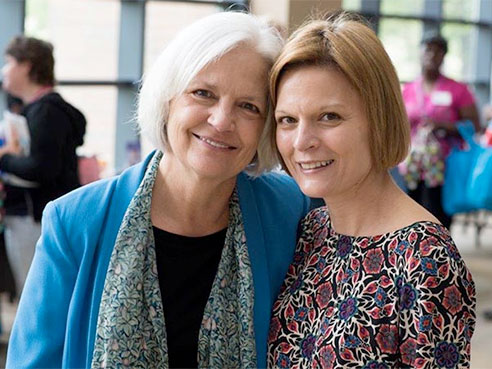Written by Don Milazzo, UAB Health System Marketing
Media contact: Alicia Rohan, arohan@uab.edu
 Madeline Harris, left, and Kristen NolesAs the coordinator and co-founder of what is now the University of Alabama at Birmingham Breast Health Center, Madeline Harris counseled and empathized with countless cancer patients over the years. She never imagined that her daughter, Kristen Noles, would someday be one of them.
Madeline Harris, left, and Kristen NolesAs the coordinator and co-founder of what is now the University of Alabama at Birmingham Breast Health Center, Madeline Harris counseled and empathized with countless cancer patients over the years. She never imagined that her daughter, Kristen Noles, would someday be one of them.
Both women are alumnae of the UAB School of Nursing. Noles spent most of her career at UAB in women’s services, but for the past three years she has served as a nurse manager for the Clinical Decision and Acute Trauma Care units. She is also an adjunct faculty member for the UAB School of Nursing.
Harris, who joined UAB in 1981, retired in 2008 as coordinator of UAB’s Multidisciplinary Breast Cancer Clinic; but she has not stopped advocating on behalf of women with breast cancer. She is now director of the Women’s Breast Health Fund of the Community Foundation of Greater Birmingham, which since 2009 has awarded more than $1.3 million to area nonprofits, helping enable holistic services for breast cancer survivors and their loved ones.
This collaborative and inaugural funding led to the Breast Cancer Survivorship Rehabilitation Initiative, today known as Forge. Services began in March. Forge is a comprehensive and patient-centered service partnership involving all area health systems, including UAB and the UAB School of Nursing, along with the Community Foundation of Greater Birmingham. The St. Vincent’s Foundation is the fiscal agent for this unprecedented collaboration. Forge provides a 24/7 support telephone line, peer-to-peer matched mentors, and advocates who are trained and available to address the unique challenges faced by women diagnosed with breast cancer and their families.
The diagnosis
In 2011 — on her 35th birthday and about a year after giving birth to her third child — Noles was diagnosed with invasive ductal and invasive lobular breast cancer. This is uncommon in pre-menopausal women like Noles.
“I’ll never forget the look on the woman’s face who performed the ultrasound,” Noles said, recalling the first test that showed several masses in her breast. “The next thing I know I’m signing consent forms and getting biopsied, and soon after I was started on aggressive chemotherapy for six months. It didn’t make any sense to me because I had no family history of cancer or risk factors. I run, I eat healthy, I don’t smoke.”
She would soon undergo a double mastectomy and reconstructive surgery.
“Because of the type of cancer, I was more likely to have another breast cancer in the opposite breast, so they felt it was safer to take both breasts,” she said.
The ordeal tested Harris’ professional experience in an entirely new way.
| “My mom never thought that her daughter would have cancer. She was out saving the world, helping cancer patients all around the community, and all of a sudden I get it. It changes things. It doesn’t matter how patient-centered you are. Until you or a close loved one has cancer, you don’t fully understand.” —Kristen Noles |
“It was very personal for her on many levels,” Noles said. “My mom never thought that her daughter would have cancer. She was out saving the world, helping cancer patients all around the community, and all of a sudden I get it. It changes things. It doesn’t matter how patient-centered you are. Until you or a close loved one has cancer, you don’t fully understand.”
For Harris’ part, she found it hard to come to grips with her daughter’s decision to continue working full time throughout her treatment — especially after serious complications arose.
“My husband tried to pay her to take off work for a year, to pay all the bills and pay to continue private school for our grandchildren because in his mind she needed rest,” Harris said. “But that’s just not Kristen’s way. As her mother it was very difficult to watch her be that busy, because in my heart she was still my little girl. I knew what it felt like to be the help, but I didn’t know what it was like to be the mom of a cancer patient.”
By virtue of their careers at UAB, the women selected the clinicians on Noles’ cancer team, so there was an established level of trust.
“The majority of the physicians who were involved in my care watched me grow up, and I watched a lot of them grow professionally,” Noles said. “How scary it must be for women who are diagnosed without that relationship.”
Paying it forward
Noles is involved in breast cancer support work of her own. She is one of the founders of The Courage Network, a campuswide breast cancer survivor group started in 2013 that comprises UAB staff who lend their hearts and ears to fellow employees facing their own cancer journey.
“Your family is unconditional, when you lose your hair and everything, and The Courage Network was sort of built on that premise,” Noles said. “It can be really helpful to have someone in the workplace who can support you, too, whether it’s getting together for coffee or lunch or just a phone chat or an occasional email.”
Noles recently celebrated five years of survivorship. She continues to take tamoxifen, a medication used to treat and prevent breast cancer. Ironically, her first job at UAB was working on a trial for the drug ahead of FDA approval.
“I was studying the drug that is now my lifeline,” Noles said. “It’s crazy how it’s come full circle.”